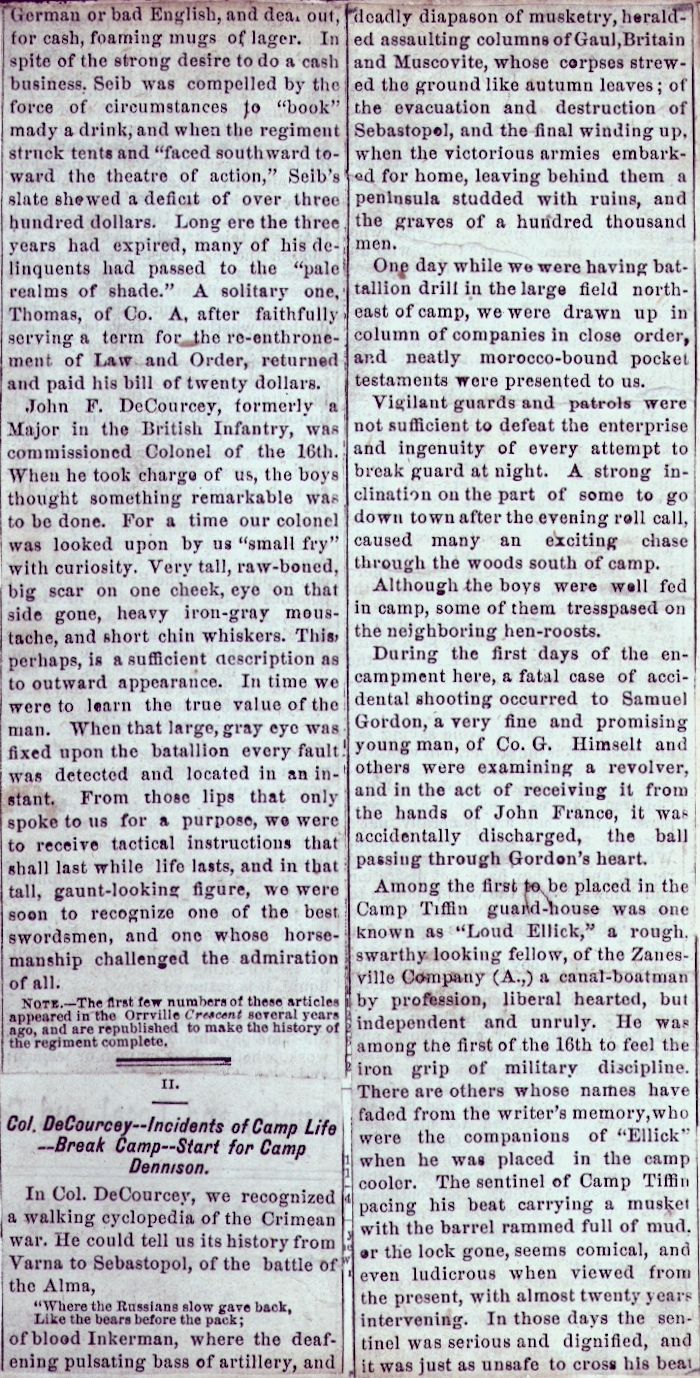| Camp & Field Page 1 | Camp & Field Index Page | 16th OVI Home Page | Camp & Field Page 3 |
The Camp & FieldArticles by Theodore Wolbach |
 Cpl. Theodore D. Wolbach |
The following image is taken from a book titled "Mortality and Statistics of the Census of 1850" in which it is believed retired Captain Rezin H. Vorhes, Company H, pasted over the pages a series of articles written by Cpl. Theodore D. Wolbach, Company E, titled "Camp and Field" and published, by chapter, in the Holmes County (Ohio) Republican newspaper from February 24, 1881 to August 17, 1882. The articles tell the story, in great detail and color, of the 16th OVI, from the inception of the 3-year regiment in October, 1861, through all its camps, battles and marches until it was disbanded on October 31, 1864. The articles pasted in the Vorhes book cover the first 35 chapters, published through October 20, 1881. All the remaining chapters were recently found in a Holmes County library by researcher Rob Garber who obtained copies, performed the transcriptions and provided to this website and which are also presented here, thus providing the complete work by Theodore Wolbach.
Throughout these articles click on the underlined white text for additional details.
The webauthor thanks 16th Ohio descendant Rob Garber for his excellent research on the Camp And Field articles and for performing the tedious digital transcription of those articles found on each page. The transcriptions were made to reflect the original articles verbatim, misspellings and all. Rob is the 3rd great nephew of Capt. William Buchanan, Company F, 16th Ohio, who served in the 90-day regiment as a private, re-enlisting in the three year regiment, and eventually making the rank of Captain of Company F. Thanks Rob!
Page 2 - Chapters 1, 2 - October, 1861
 |
German or bad English, and deal out, for cash, foaming mugs of lager. In spite of the strong desire to do a cash business, Seib was compelled by the force of circumstances to John F. DeCourcey, formerly a Major in the British Infantry, was commissioned Colonel of the 16th. When he took charge of us, the boys thought something remarkable was to be done. For a time our colonel was looked upon by us NOTE.--The first few numbers of these articles appeared in the Orrville Crescent several years ago, and are republished to make the history of the regiment complete. Published in Holmes County Republican II. Col. DeCourcey--Incidents of Camp Life--Break Camp--Start for Camp Dennison. In Col. DeCourcey, we recognized a walking cyclopedia of the Crimean war. He could tell us its history from Varna to Sebastopol, of the battle of the Alma, Where the Russians slow gave back,
|
deadly diapason of musketry, heralded assaulting columns of Gaul, Britain and Muscovite, whose corpses strewed the ground like autumn leaves; of the evacuation and destruction of Sebastopol, and the final winding up, when the victorious armies embarked for home, leaving behind them a peninsula studded with ruins, and the graves of a hundred thousand men. One day while we were having battalion drill in the large field northeast of camp, we were drawn up in columns of companies in close order, and nearly morocco-bound pocket testaments were presented to us. Vigilant guards and patrols were not sufficient to defeat the enterprise and ingenuity of every attempt to break guard at night. A strong inclination on the part of some to go down town after the evening roll call, caused many an exciting chase through the woods south of camp. Although the boys were well fed in camp, some of them trespassed [sic] on the neighboring hen-roosts. During the first days of the encampment here, a fatal case of accidental shooting occurred to Samuel Gordon, a very fine and promising young man, of Co. G. Himself and others were examining a revolver, and in the act of receiving it from the hands of John France, it was accidentally discharged, the ball passing through Gordon's heart. Among the first to be placed in the Camp Tiffin guard-house was one known as |
| Camp & Field Page 1 | Camp & Field Index Page | 16th OVI Home Page | Camp & Field Page 3 |